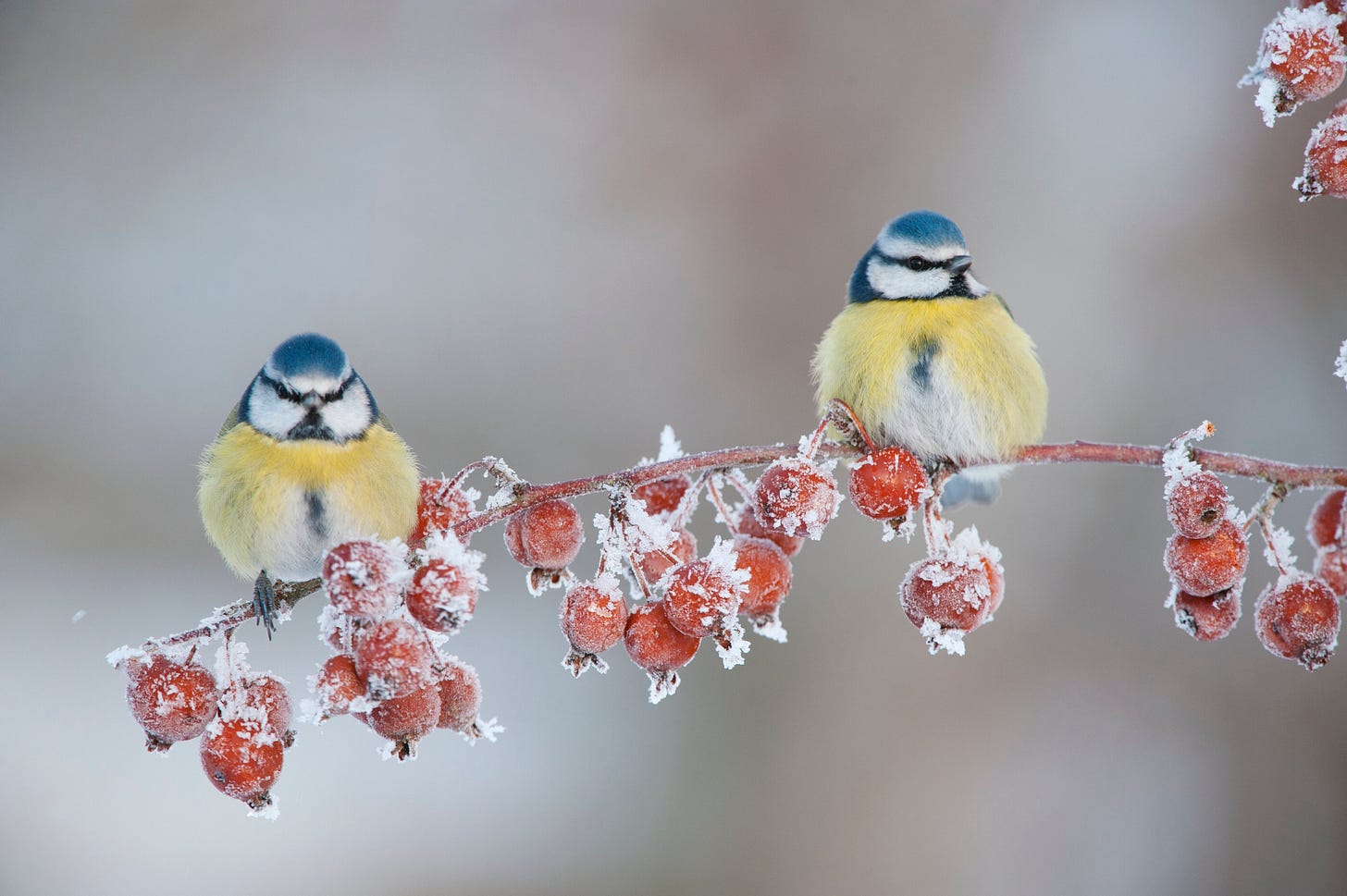"We’re calling for a new land designation, Wildbelt"
Government and developers must put nature recovery first, urges new report on England’s housebuilding drive
Good morning! I’m Sarah Hartley and this is The Northern Eco weekly update. As you’ve received this newsletter then either you subscribed, or someone forwarded it to you. If the latter, then you can click on this handy little button below.
A new report published by The Wildlife Trusts urges the UK Government to put nature first, as it embarks on a housebuilding drive across England. The report outlines how planning reforms can help to address challenges of climate change, nature loss, housing and public health – but only by placing nature recovery at the heart of new developments.
Swift and wild: How to build houses and restore nature together calls for a strategic approach towards housebuilding as part of achieving environmental targets, including net-zero and protecting 30% of land for nature by 2030. The report highlights the importance of improving energy efficiency and access to nature during the housebuilding process.
The UK Government has pledged to build 1.5 million homes over the next five years. It recently announced a consultation to revise planning policy in England to deliver more affordable, well-designed homes quickly, grow the economy and support green energy.
The Wildlife Trusts, a grassroots movement of 46 charities with more than 910,000 members and 35,000 volunteers, identifies various approaches that can have positive impacts for nature, climate and communities. They include community energy schemes, urban habitat creation, sustainable drainage systems, wildlife-friendly lighting and local food growing opportunities. The Wildlife Trusts want developers to learn from each other to deliver affordable, efficient and nature-friendly housing.
One of the Trust’s schemes is in the Tees Valley where Durham Wildlife Trust has secured 636 acres of land to realise the vision for a Great North Fen. The Trust says that mitigation in the Tees catchment has delivered greater benefits for developers by streamlining and speeding up the gaining of planning permission. There’s also greater benefits for nature by ensuring that mitigation sites deliver wildlife benefit on top of the water pollution protections they provide.
Craig Bennett, chief executive of The Wildlife Trusts, said new developments must help to create more habitat for wildlife, including throughout urban areas.
“The UK has agreed to protect at least 30% of land for nature by 2030, yet the latest calculations show we’re heading in the opposite direction. All communities deserve to benefit from living in nature-rich neighbourhoods, and both governments and developers have a responsibility to make that happen. It’s not good enough just to protect the nature we’ve got left. We need to create new space for nature, which is why we’re calling for a new land designation, Wildbelt, to rebuild our natural infrastructure alongside built infrastructure. This could be a game-changer for UK nature recovery.”
Swift and wild: How to build houses and restore nature together calls for:
Strategic and nature-centric planning: The UK needs a strategic and joined-up approach to housebuilding that complements nature recovery and balances competing demands on land. The planning system should always avoid causing harm to legally protected areas, such as Sites of Special Scientific Interest and Special Areas of Conservation. A new land designation, Wildbelt, would put nature at the heart of the planning process by protecting land of low biodiversity value specifically for nature recovery. Wildbelt would also support local authorities to implement statutory biodiversity duties and deliver Local Nature Recovery Strategies.
Climate action through development: Buildings are one of the UK’s largest sources of carbon emissions. Improving energy efficiency by retrofitting homes and embedding features like solar panels, rainwater harvesting, and green roofs can reduce emissions and bills, while benefitting health, well-being and wildlife. Implementing some of these changes widely could help the UK achieve net-zero. Inexpensive, small-scale changes – such as including swift bricks in new developments – can support nature recovery and contribute to wildlife corridors.
Nature-rich neighbourhoods: Integrating nature into new developments provides multiple health, social and environmental benefits. These include health and well-being impacts for people, reduced air pollution and better protection from flooding. Evidence shows that people with better access to nature are more active, mentally resilient and have better all-round health. New developments should help to connect nature reserves and other important areas for wildlife and ensure that everyone can access greenspace within 15 minutes’ walk or wheel.
Becky Pullinger, head of land use planning at The Wildlife Trusts, said nature, climate and housing could not be treated as entirely separate issues.
“By embedding nature recovery into the planning system, we can tackle these challenges together and build homes that are energy-efficient, affordable and playing a meaningful part in restoring nature. Historic developments in the wrong place are partly responsible for habitat loss and pollution, which have contributed to massive declines in wildlife. The UK Government is right to be ambitious about building houses and green energy– it must also show equal ambition for restoring nature.”
The full report Swift and wild: How to get Britain building and restoring nature by The Wildlife Trusts can be downloaded here.
The three most clicked links from last week were:
The Nidderdale couple running a hog-spital for hedgehogs
A Gap: Reflections on the deliberate felling of ‘The Robin Hood Tree’ at Sycamore Gap in Northumberland
Survey update

Thanks to those of you who have ready completed the 100 issue milestone survey from last week. Sadly, that’s only 2% of you even though 45% of you opened the survey! Can I persuade the rest of you to complete it this week? There’s only five questions, it’s anonymous and it really would help to hear from you. The link is here. So far, it’s been lovely to learn that you enjoy the weekly newsletter and, to the person who said they miss The Planet on Sunday - watch this space! I would love to find a way to bring it back in some form before the year is out…..
Water pollution news
💦 How will you spend that £10? Yes, last week’s big OFWAT announcement may have sounded like big numbers with £114M being refunded by the water companies but it’s just a droplet for you and me when our bills land. The news didn’t impress the river campaigners much…..“The water system is broken and no amount of tinkering around the edges with fines will fix it,” said professor Becky Malby from the Ilkley Clean River Group at The Ilkley Journal. “Our rivers, lakes and seas cannot wait for poorly conceived plans and unmet promises while water companies continue to pollute for profit.”
PS: If you’re struggling for ideas on how to spend that tenner - two month’s subscription here + enough change for a coffee? Bargain ;)
💦 Northumbrian Water recently launched a £20m project that is set to significantly reduce storm overflow discharges across the Tyneside area. The project is the first of its kind in the UK and will use world-leading technology, reports Mike Hughes at The Northern Echo.
💦 The privatised English water system has been singled out for criticism by the UN special rapporteur on the human right to clean water. Sandra Laville has more at The Guardian.
In other news
🌳 Trees felled by Storm Arwen in 2021, are being used by Northumbrian Water and environmental charity Tweed Forum in a green engineering root wad system that will help stabilise a river bank on the Wooler Water. Andrew Coulson at the Northumberland Gazette reports that the scheme will protect critical infrastructure and provide new habitat for invertebrates and the juvenile fish who feed on them.
🐝 The British Beekeepers’ Association (BBKA), representing more than 30,000 members in England and Wales, has launched the 'Bee Smart, Choose Local' campaign to mark the national day. Will Abbott at The York Press has more.
✍️ Fund Britain’s Waterways is looking for support calling on the Prime Minister to acknowledge the many social, economic and environmental benefits that Britain’s inland waterways provide and give assurance that the government will intervene, where necessary, to ensure our rivers and canals remain fully open, navigable, safe and accessible for all. The petition is here on Change.org.
⚡️ An energy sector innovation body has struck an academic alliance it says will drive forward the green transition. Steven Hugill at BDaily reports that The Offshore Renewable Energy (ORE) Catapult has signed a memorandum of understanding with Durham University.
🌳 Lancashire County Council is planning to create a so-called ‘Miyawaki Forest’ in Haslam Park in Ashton, close to the Lancaster Canal, Paul Faulkner reports at Lancashire Live.
🪶 Rewilding group Make It Wild has had a new Sand Martin habitat erected at one of its key conservation sites in Skipbridge, writes Kevin Glenton at The York Press.
Want to learn more about the climate?
“This should be compulsory for everyone! Given the nature of the climate emergency, this course should be standard education for everyone. It is useful and inspiring at the same time!”
The comment above was just one piece of hugely supportive feedback from the first group of people to complete our accredited Carbon Literacy course last week. The participants joined us online from Finland, Brussels, Wales and England to learn more about the science behind climate and look at ways they could work to reduce carbon emissions.
If you’d like to learn more, we’re now up and running with workshops to help people understand more about the climate and how to take action to reduce carbon. More information and booking details on that here.
No newsletter next week
I’m off to the Climate Arena Conference this week to join my fellow fellows! There’s 15 of us, all journalists from across Europe who’ve been selected to work on significant eco projects and we get to meet up IRL for the first time next week to start work. That’ll mean no time for a newsletter for Oct 22 but rest assured, the monthly reading recommendations from Claire and Alan at The Wonky Tree will be back in your inbox on Tuesday, October 29. Until then!
🌼 Thank you for reading edition number 101 of The Northern Eco. This newsletter remains independent, free unless you want to pay, ad-free and proudly reader supported thanks to paying subscribers. The main newsletter is sent out at 7am on a Tuesday and can’t exist without paying subscribers. Please do subscribe to keep it going - I can’t do it without your support. Thanks!





